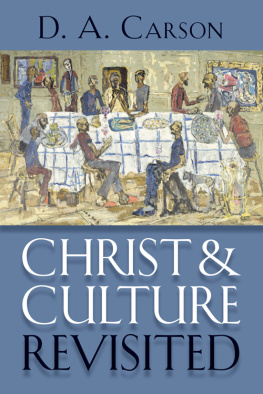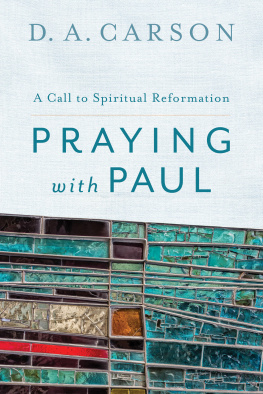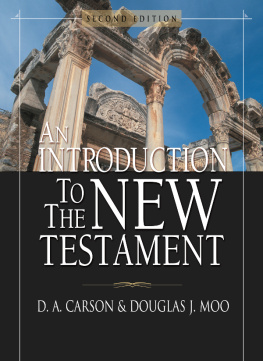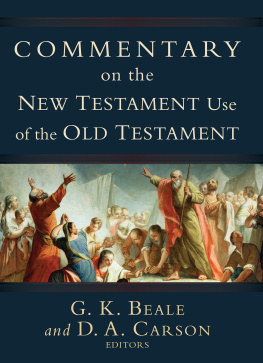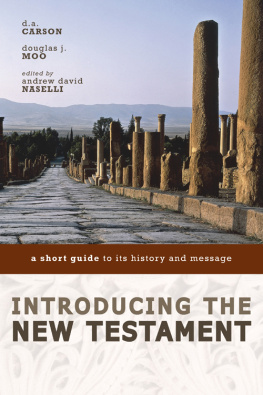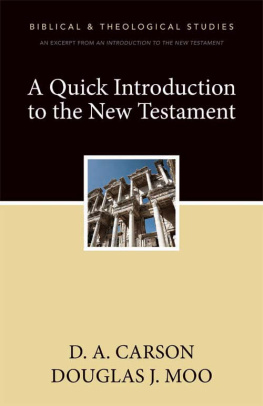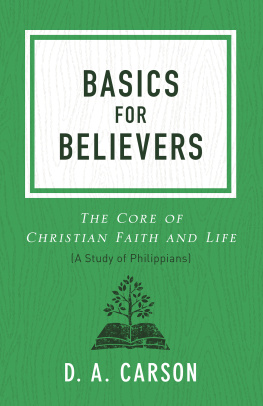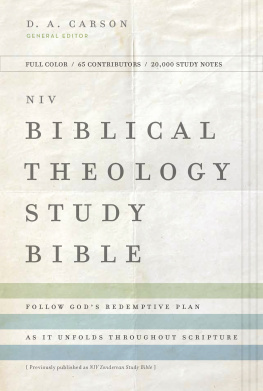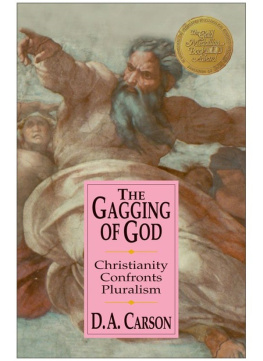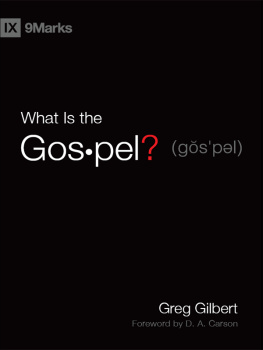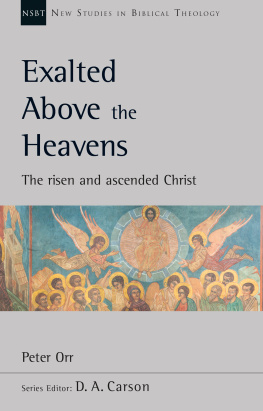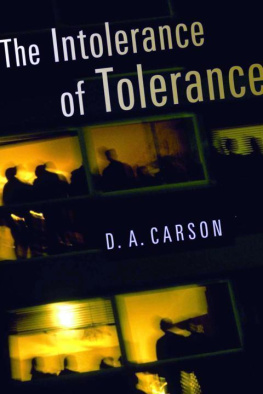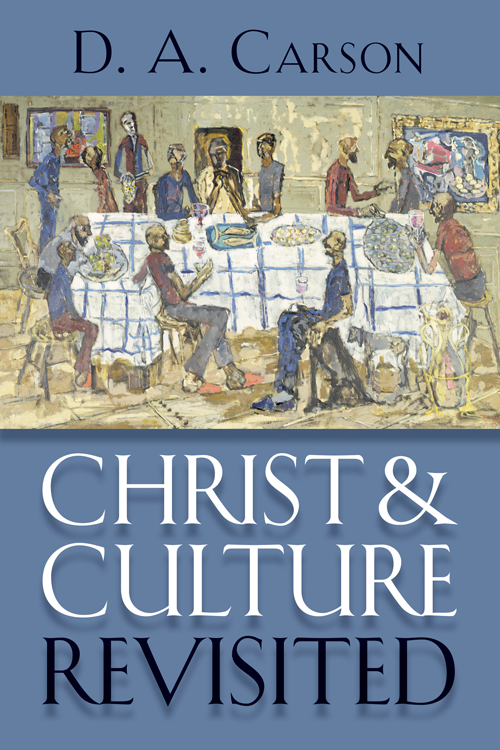
Christ and Culture Revisited

D. A. Carson
WILLIAM B. EERDMANS PUBLISHING COMPANY
GRAND RAPIDS, MICHIGAN / CAMBRIDGE, U.K.
2008 D. A. Carson
All rights reserved
First edition 2008
Paperback edition 2012
Wm. B. Eerdmans Publishing Co.
2140 Oak Industrial Drive N.E., Grand Rapids, Michigan 49505 /
P.O. Box 163, Cambridge CB3 9PU U.K.
Library of Congress Cataloging-in-Publication Data
Carson, D. A.
Christ and culture revisited / D. A. Carson.
p. cm.
Includes bibliographical references and .
ISBN 978-0-8028-3174-3 (cloth: alk. paper)
ISBN 978-0-8028-6738-4 (pbk.: alk. paper)
ISBN 978-1-4674-2604-6 (ePub)
ISBN 978-1-4674-0018-3 (Kindle)
1. Christianity and culture.
2. Niebuhr, H. Richard (Helmut Richard), 1894-1962. Christ and culture.
I. Title.
BR115.C8C333 2008
261 dc22
2007046554
www.eerdmans.com
This one is gratefully dedicated
to
Scott and Cathy
Contents


Four considerations impelled me to write this book.
First, ever since Pentecost Christians have had to think through the nature of their relationships with others. Christians soon multiplied in number and across an amazing number of racial and social barriers, constituting a church, a fellowship, a body, that transcended the established categories of empire, ethnicity, language, and social status. Even within the pages of the New Testament, Christians are told both to view government as something ordained by God and to view at least one particular government as representative of antichrist. The earliest reported squabbles within the church turned in part on cultural differences, on perceived injustices in the distribution of services to different language groups. Beyond the pages of the New Testament, even a casual knowledge of the history of the church discloses an incredible diversity of situations in which Christians have found themselves: persecuted and reigning, isolated and dominant, ignorant and well educated, highly distinguishable from the surrounding culture and virtually indifferentiable from it, impoverished and wealthy, evangelistically zealous and evangelistically dormant, social reformers and supportive of the social status quo, hungry for heaven and hoping it wont arrive too soon. All of these polarized possibilities reflect diverse cultural self-understanding. Inevitably, in most generations Christians have pondered what their attitudes ought to be. Mine is merely one more voice in this long chain of Christian reflection.
significantly modified. Even the sweeping cultural analysis of H. Richard Niebuhr, about which Ill say much more, though it trawls through history to enrich the study, is transparently the stance of a mid-twentieth-century Westerner steeped in the heritage of what liberal Protestantism then was. Today, however, the sheer diversity of Christian experience is forced on our attention as never before. We become so suspicious of glib analyses that seem to be true in one cultural situation and patently irrelevant elsewhere, that we attempt only local analysis. But I shall argue that something important, something transcendent, is lost by this failure of nerve.
The third impetus is the advisee group what some institutions call small group or chaplaincy group or formation group at Trinity Evangelical Divinity School for which Scott Manetsch and I have shared responsibility during the last few years. This group continues to be one of my constant joys in life, not only for the privilege of working with Scott, but also because of all the relationships that have been formed, and, in measure, shaped, by that group. A couple of years ago, we worked through a short unit on Christians and culture. Inevitably, one of the starting points for the discussion was the classic work by Richard Niebuhr. The discussion that erupted at that time prompted me to do some more work and put down on paper a few things I had been thinking about for some time.
Finally, an invitation from the Facult libre de thologie vanglique at Vaux-sur-Seine, just outside Paris, to give some lectures at one of their theological colloquia served as the incentive to start writing up my notes. The first two chapters of this book were presented at Vaux. I want to express my profound thanks to mile Nicole and the other members of the faculty, and not least to my old friend Henri Blocher, for the warmth of their welcome and the acuteness of their interaction. I should add that although I was reared in French and can still speak it pretty fluently, I have lived outside the French-speaking world for so many decades that I do not trust myself to write polished French. I am therefore profoundly grateful to Pierre Constant, a former (and highly gifted) doctoral student at Trinity, for giving the French form of these chapters whatever grace they display.
Even though Niebuhrs Christ and Culture is more than fifty years old, it is difficult, at least in the English-speaking world, to ignore him. His work, for good and ill, has shaped much of the discussion. Even the celebrated distinctions of earlier scholars such as Webers distinction between church and sect, in which the church sets itself up as part of the culture while the sect sets itself up as something over against the culture have been mediated to many people through Niebuhrs volume. On the other hand, during the last half-century, many debates have raged over the very meaning of culture. Disenchanted by the arrogance of some Enlightenment assumptions, many writers have questioned those assumptions, raising a raft of new questions about how Christians or any other religious group, for that matter should think of themselves with respect to the surrounding culture, when they themselves cannot escape being part of that culture.
My own effort in this book begins by summarizing Niebuhr, since Niebuhr has become an icon to which everyone refers, though few today still read him closely. Apart from some initial evaluation of Niebuhr on his own terms, I then try to lay out the rudiments of a responsible biblical theology that any Christian will want to acknowledge, and begin to show how these turning points in the history of redemption must shape Christian thinking about the relationships between Christ and culture (). Here I have sketched the very different cultural stances associated with the notion of separation of church and state found in France and in the United States, with glances at a few other countries, so that we can more clearly detect the kinds of cultural spectacles we inevitably bring to the task of reading Scripture, and how even the application of the balance of Scripture will almost inevitably shift in different cultures. The final chapter raises a selection of perennial temptations Christians face as they work through these issues. It is a modest attempt to forge a stable and flexible stance that is immune to various siren calls.
. And finally, I am thankful to the folk at Eerdmans for seeing this work safely and efficiently through the press.
Soli Deo gloria.
D. A. CARSON
Trinity Evangelical Divinity School
See especially Don Cormack, Killing Fields, Living Fields (London: Monarch, 1997).

Next page
